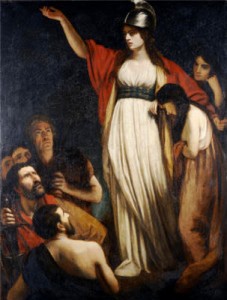 “Boadicea Haranguing the Britons” by John Opie (1761-1807) ‘Tough’, ‘feisty’, ‘kick-ass’ – clichés, ironic or signposts? And, provocative question, would you apply them to men? Perhaps the first one and possibly the third, but I can’t remember reading about a ‘feisty hero’.
That aside, how do you recognise a tough heroine?
Boudica, queen of the British Iceni tribe – led an uprising against the occupying forces of the Roman Empire.
Katniss Everdeen from The Hunger Games – physical skill and strength of character
Eowyn from Lord of the Rings – fights for what she believes to be right
Jane Eyre – strength of will and character to survive challenges in her life
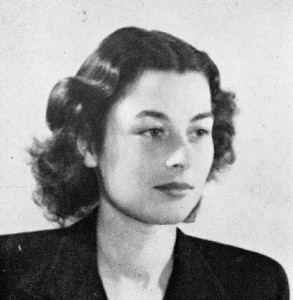 Violette Szabo GC Or perhaps Violette Szabo – a true story immortalised in Carve her Name with Pride – courageous, understated, self-sacrificing
Lizzie Bennett – smart, witty, full of integrity to the point of recklessness, but honest enough to admit when she’s wrong.
Early Roman Cloelia who led the escape of hostages from Lars Porsena c.508 BC
Arya Stark from Game of Thrones – tough physically, mentally and emotionally
Some common themes here…
So how do you write a tough heroine?
 The biggest challenge is plausibility. A completely accomplished all-singing, all-dancing toughie doesn’t work. Yes, this kind of operator needs to be strong, skilled and savvy, but her life will be much more than that. And she’s unlikely to have been born like that, unless genetically altered in a future far, far away. Even Hanna, (2011), the sixteen-year-old girl who was raised by her father to be the perfect assassin started as a ‘standard’ child. Readers need to see where she came from, what turned her from an ordinary girl into the book’s heroine. Usually she passes through a formative traumatic event but writers need to give hints about resilience, integrity and an ability to develop confidence as well as physical abilities. Undoubtedly, a strong female character has to have an equally strong will and a passion to drive through what she believes in. The biggest challenge is plausibility. A completely accomplished all-singing, all-dancing toughie doesn’t work. Yes, this kind of operator needs to be strong, skilled and savvy, but her life will be much more than that. And she’s unlikely to have been born like that, unless genetically altered in a future far, far away. Even Hanna, (2011), the sixteen-year-old girl who was raised by her father to be the perfect assassin started as a ‘standard’ child. Readers need to see where she came from, what turned her from an ordinary girl into the book’s heroine. Usually she passes through a formative traumatic event but writers need to give hints about resilience, integrity and an ability to develop confidence as well as physical abilities. Undoubtedly, a strong female character has to have an equally strong will and a passion to drive through what she believes in.
 In INCEPTIO, Karen starts off as an office worker, but we see from the first page that she’s prepared to stand her ground against people doing wrong, even knocking them to the ground when they’ve attacked her. Within the first chapters we know she goes to the gym, we’re with her when she jogs in the park; she’s outdoorsy and sporty. Her disrupted childhood with a barren and loveless adolescence has made her learn to protect herself emotionally, and question everything. She demonstrates signs of mental and physical toughness and resilience, even when living in a ‘normal’ existence, almost to the level of not feeling completely at ease in her own skin. So when she becomes an undercover operative, she already has many latent characteristics required. In INCEPTIO, Karen starts off as an office worker, but we see from the first page that she’s prepared to stand her ground against people doing wrong, even knocking them to the ground when they’ve attacked her. Within the first chapters we know she goes to the gym, we’re with her when she jogs in the park; she’s outdoorsy and sporty. Her disrupted childhood with a barren and loveless adolescence has made her learn to protect herself emotionally, and question everything. She demonstrates signs of mental and physical toughness and resilience, even when living in a ‘normal’ existence, almost to the level of not feeling completely at ease in her own skin. So when she becomes an undercover operative, she already has many latent characteristics required.
Beware of bunny rabbits and kittens…
The second challenge is not falling into the trap of making a strong character have moments of unbelievable weakness. Doubt, a temper, love for movies, joking with colleagues, buying gifts for friends help to round a character out, but writers must not go too far into fluffy-bunny-land and over-compensate for the toughness.
 A military type will drink and swear – it’s the pressure of the job – but she will have the normal emotions of any other woman, although expressed differently. Karen/Carina under pressure often feels aggressive towards people who have hurt the people she cares about, but it’s her way of showing she cares. Other times she finds everything too much and we see tears and fears. But her habit of picking herself up and facing up to what has to be done has been her way of coping since the death of her parents. A military type will drink and swear – it’s the pressure of the job – but she will have the normal emotions of any other woman, although expressed differently. Karen/Carina under pressure often feels aggressive towards people who have hurt the people she cares about, but it’s her way of showing she cares. Other times she finds everything too much and we see tears and fears. But her habit of picking herself up and facing up to what has to be done has been her way of coping since the death of her parents.
Courage doesn’t come from ‘boldly going’, but from ‘boldly going’ when you are half scared to death and you’re not at all sure you’re going to get out of the situation without being killed.
What do you think makes a strong heroine?
Alison Morton is the author of Roma Nova thrillers, INCEPTIO, PERFIDITAS, SUCCESSIO and AURELIA. The fifth in the series, INSURRECTIO, was published on 12 April 2016.
Find out Roma Nova news and book progress before everybody else, and take part in giveaways by signing up for her free monthly email newsletter.
If you enjoyed this post, do share it with your friends!Like this:Like Loading...
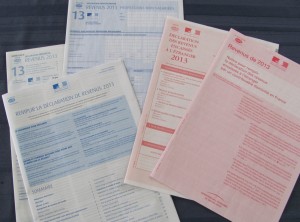 As I sit down to fill in my tax return, I’m looking for any distraction. I wondered how the ancient Romans were taxed. Today we have income tax, company/corporation tax, sales taxes/VAT, excise duties (road fund licence (UK), alcohol, cigarettes), local taxation, inheritance tax, to name but a few. But how similar are our taxes to theirs? As I sit down to fill in my tax return, I’m looking for any distraction. I wondered how the ancient Romans were taxed. Today we have income tax, company/corporation tax, sales taxes/VAT, excise duties (road fund licence (UK), alcohol, cigarettes), local taxation, inheritance tax, to name but a few. But how similar are our taxes to theirs?
Globally, taxation under the Roman Empire was about 5 percent of gross product. Individuals typically paid from 2 to 5 percent. The tax code was complex; direct and indirect taxes, some paid in cash and some in kind (hopefully not weeks’ old fish). Taxes might be specific to a province (read local authority/state), or special types of property such as fisheries or salt evaporation ponds (rateable value).
Tax revenue in Rome had one principal object – to maintain the military. Taxes in kind were accepted from less-monetized areas, especially if it was grain, animals or goods supplied to army camps.
The primary source of direct tax revenue was individuals, who paid a poll tax (ha!) and a tax on their land (rates/council tax), construed as a tax on its produce or productive capacity (business tax). Supplemental forms could be filed by those eligible for certain exemptions; for example, Egyptian farmers could register fields as fallow (set aside) and tax-exempt depending on flood patterns of the Nile (tax credits).
The amount of tax payable was determined by the census, which required each head of household to make a declaration to the censor’s official and provide a head count of his household, as well as an accounting of property he owned that was suitable for agriculture or habitation. Read Lindsey Davis’ Falco adventure “Two for the Lions” about the room for abuse and how tax collectors could make a not un-useful fee for this work.
A major source of indirect-tax revenue was the portoria – customs and tolls on imports and exports – including among provinces. (Thanks to free trade within the EU, we no longer have this in Europe – hooray!) Special taxes were levied on the slave trade. Toward the end of his reign, Augustus instituted a 4 percent tax on the sale of slaves, which Nero shifted from the purchaser to the dealers, who responded by raising their prices. An owner who manumitted a slave paid a “freedom tax”, calculated at 5 percent of value. (No legal modern equivalent, TG, but it does have echoes of stamp duty on property transactions.)
Inheritance tax of 5 percent was levied when Roman citizens above a certain net worth left property to anyone but members of their immediate family (inheritance tax). Revenues from the estate tax and from a 1 percent sales tax on auctions went toward the veterans’ pension fund (aerarium militare).(How sensible – MOD, please note.)
Low taxes helped the Roman aristocracy increase their wealth, which equaled or exceeded the revenues of the central government. An emperor sometimes replenished his treasury by confiscating the estates of the “super-rich”, but in the later period, the resistance of the wealthy to paying taxes was one of the factors contributing to the collapse of the Empire. (Ouch! A chilling lesson for modern times.)
So the principle and methodology of taxation were two more things the Romans did for us. If we’re not careful with the one in the last paragraph, it may do for us as well.
Alison Morton is the author of Roma Nova thrillers, INCEPTIO, and PERFIDITAS. Third in series, SUCCESSIO, is out early summer 2014.
If you enjoyed this post, do share it with your friends!Like this:Like Loading...
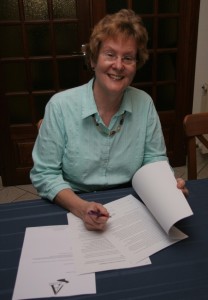 It’s official and I’m It’s official and I’m
• delighted (normal me)
• thrilled (as per my books)
• quietly pleased (very British)
• ecstatic (OTT)
(Highlight or delete as applicable)
Why?
Because I will be working with Annette Crossland of A for Authors literary agency, who will be handling the subsidiary and foreign rights for my books.

This is new territory for me, but I’m absolutely delighted to have the experience and enthusiasm of Annette and her business partner, Bill Goodall, to deal with everything overseas plus the non print and non ebook versions here in the UK.
The Roma Nova series is gathering reviews, fans and love every day and needs to go out to large audiences.
Over to Annette!
 “It is so rare to receive a submission, sit down, read it and then think “Oh my goodness, how is it that this novel isn’t being published around the world?” “It is so rare to receive a submission, sit down, read it and then think “Oh my goodness, how is it that this novel isn’t being published around the world?”
Well, Alison Morton succeeded in grabbing our attention BIG TIME, and once we read INCEPTIO, the die was cast! We are so EXCITED that Alison has agreed to join our team of marvellous authors and we look forward to furthering her already extraordinary success”. Annette Crossland
UPDATE: Here’s my beautifully formatted page on A for Authors’ website. That was quick!
Alison Morton is the author of Roma Nova thrillers, INCEPTIO, and PERFIDITAS. Third in series, SUCCESSIO, is now out.
Find out more about Roma Nova, its origins, stories and heroines…
If you enjoyed this post, do share it with your friends!Like this:Like Loading...
 Well, PERFIDITAS made it to the HNS Indie Reviews Editor’s Choice Shortlist which was rather thrilling. I’m so pleased that the HNS includes alternate history in its remit – it just shows what an ecumenical and friendly society it is. Well, PERFIDITAS made it to the HNS Indie Reviews Editor’s Choice Shortlist which was rather thrilling. I’m so pleased that the HNS includes alternate history in its remit – it just shows what an ecumenical and friendly society it is.
So what did they say about PERFIDITAS?
PERFIDITAS (Roma Nova)
By Alison Morton
“Not strictly an historical novel, PERFIDITAS is an alternative history adventure thriller that will delight crime fiction readers, but may also be enjoyed by Roman fans as Ms Morton has very cleverly blended into a modern tale the ‘what-might-happen’ had the Roman Empire survived to present day. PERFIDITAS continues the story started in the first book of this intriguing series, INCEPTIO, with more thrilling excitement from kick-ass Captain of Special Forces, Carina Mitela – the Special Forces being the equivalent to the Praetorian Guard.
An attempted coup threatens the matriarchal government of Roma Nova, which could destroy two millennia of achievement. Carina hopes to put matters right, but betrayal sees her becoming a fugitive, going undercover to preserve her family’s honour, and she is forced to fight her way back with her skills of courage, determination and wonderful gadgetry.
This is a fast-paced read, although I did find the opening a little difficult to get into, trying to sort out the backstory and recall the main players from book one, who they were, what they did. Reading this on Kindle I did not see the useful cast list until the end – maybe slot it in at the beginning? (Or better still, read the hardcopy book, not the e-book version!) However, the breathless plots and sub-plots soon took hold – one in particular that I did not see coming was most exciting.
The attention to detail is superb, as is the believability of this alternative history existence. It is a skilfully and intelligently written story, with first-class production and presentation: all indie books should aim for this professional standard.”
Link to the review on the HNS website
Wow!
If you aren’t a member, but love reading or writing historical fiction, you’ll find true enthusiasts here.
Find out more about the society here.
Alison Morton is the author of Roma Nova thrillers, INCEPTIO, and PERFIDITAS. Third in series, SUCCESSIO, is out early summer 2014.
If you enjoyed this post, do share it with your friends!Like this:Like Loading...
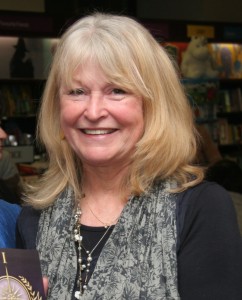 I am delighted to welcome a very special guest to my blog today, somebody who has supported Roma Nova since its earliest days. Sue Cook is one of the UK’s most experienced and popular broadcasters: You and Yours, Nationwide, Breakfast Time, Children in Need, Holiday, Crimewatch and most recently Making History and The Write Lines. Sue’s first novel ‘On Dangerous Ground’ was published by Hodder Headline in paperback in November 2006 and her second, ‘Force of Nature’, was also published by Hodder Headline in 2009. She is currently adapting ‘On Dangerous Ground’ for a film of the same title and writing her third novel. She is an Ambassador for the Prince’s Trust and a patron of the Rainbow Trust, the Children’s Liver Disease Foundation and the British Wireless Fund for the Blind. I am delighted to welcome a very special guest to my blog today, somebody who has supported Roma Nova since its earliest days. Sue Cook is one of the UK’s most experienced and popular broadcasters: You and Yours, Nationwide, Breakfast Time, Children in Need, Holiday, Crimewatch and most recently Making History and The Write Lines. Sue’s first novel ‘On Dangerous Ground’ was published by Hodder Headline in paperback in November 2006 and her second, ‘Force of Nature’, was also published by Hodder Headline in 2009. She is currently adapting ‘On Dangerous Ground’ for a film of the same title and writing her third novel. She is an Ambassador for the Prince’s Trust and a patron of the Rainbow Trust, the Children’s Liver Disease Foundation and the British Wireless Fund for the Blind.
Welcome, Sue. I’ve recently read On Dangerous Ground – a very enjoyable read with a clever title! What led you to pick Vietnam as the setting?
I wanted to set a story in Vietnam ever since I spent most of 1972 as a singer with a band performing around US navy bases in Spain. The Vietnam war was in full spate at that time and I we met so many young men aged 17 or 18 who knew they were going to be sent off to fight in Vietnam and desperately didn’t want to go.
 Ho Chi Minh City (Saigon) I’ve often wondered since what happened to them; the carnage they witnessed, whether they killed people or were themselves killed. And so when I decided to set my first novel, On Dangerous Ground, in an exotic country, Vietnam immediately sprang to mind. I created my main male character Ben as a war veteran who has gone back, forty years on, to try to help make amends in his own way for the terrible damage his countrymen did to Vietnam and its people. Like most of the surviving American soldiers he fought alongside with, he has to live the rest of his life with the memories of the terrible things he saw and was involved in during those years.
 My first visit to Vietnam in 1998 to research the novel revealed my instincts to be right – many US veterans of that war were forging new links with the people they were once forced to treat as enemies, and trying to compensate by putting something back. One man I met in Saigon had worked tirelessly to raise the money to build an orphanage and, having established it, now spends four months every year living and working with the children there. Another was training youngsters to be athletes, in the hope of making Vietnam a serious Olympic contender one day. My first visit to Vietnam in 1998 to research the novel revealed my instincts to be right – many US veterans of that war were forging new links with the people they were once forced to treat as enemies, and trying to compensate by putting something back. One man I met in Saigon had worked tirelessly to raise the money to build an orphanage and, having established it, now spends four months every year living and working with the children there. Another was training youngsters to be athletes, in the hope of making Vietnam a serious Olympic contender one day.
Another impressive man was addressing the problem of the many babies who are born, even today, with deformities and disfigurements as a result of the war-poisoned land. He persuaded the Ford Motor Company to lend him a car once a month to transport box loads of prosthetic limbs from the manufacturers at Ho Chi Minh City Hospital to children in the outlying villages who need them desperately but can’t afford the long journey into the city to have them fitted. It was this last man on whom I decided to base my character Ben.
 Halong I’m so glad I chose Vietnam as the backdrop for my book. There’s so much I was able to drop into the story that most of us don’t know about the country and its extraordinary resilient people who refuse to look in any direction but forward.
You’re known as one of the UK’s most experienced broadcasters. If you had to choose now between presenting a high profile series that would top the ratings or the life of an international best-selling writer which would you choose and why?
Well… this is a tricky one, because you’re asking me to choose between success and success!
 The Crimewatch gang Chance would be a fine thing! I think I’d have to choose the broadcasting job. I have to admit that I adore the buzz being in a TV or radio studio – particularly when the show is broadcast live.
It concentrates the mind, gets the adrenalin going and… well. it’s the job I did for more than thirty years and there’s no pleasure like knowing you are doing a competent job.
 With Terry Wogan, for Children in Need Writing is so much more subjective. Is what I’ve written good? Will it strike a chord with the reader? Or does it lack something? Does it just miss its mark? And of course, unlike TV presenting where team work is vital to get a programme on the air, writing is a solitary business. I do prefer to be part of a wonderful chorus than a lead singer out front.

Being a best-selling writer would involve travel, which I adore, but I could still do that with my TV earnings! I think what I’m basically owning up to here is that writing is a much more difficult job, and I’m choosing the easier option!
Thank you so much for sharing your thoughts, especially about my second question!
Sue’s books are available in the usual places and now available to download from Amazon: On Dangerous Ground Force of Nature
Website: http://suecook.com/ including some great moments from her broadcasting career http://suecook.com/gallery/
Alison Morton is the author of Roma Nova thrillers, INCEPTIO, and PERFIDITAS. Third in series, SUCCESSIO, is out early summer 2014.
If you enjoyed this post, do share it with your friends!Like this:Like Loading...
|
Subscribe to Blog via Email
Join 50 other subscribers.
Categories
Archive
|
 The biggest challenge is plausibility. A completely accomplished all-singing, all-dancing toughie doesn’t work. Yes, this kind of operator needs to be strong, skilled and savvy, but her life will be much more than that. And she’s unlikely to have been born like that, unless genetically altered in a future far, far away. Even Hanna, (2011), the sixteen-year-old girl who was raised by her father to be the perfect assassin started as a ‘standard’ child. Readers need to see where she came from, what turned her from an ordinary girl into the book’s heroine. Usually she passes through a formative traumatic event but writers need to give hints about resilience, integrity and an ability to develop confidence as well as physical abilities. Undoubtedly, a strong female character has to have an equally strong will and a passion to drive through what she believes in.
The biggest challenge is plausibility. A completely accomplished all-singing, all-dancing toughie doesn’t work. Yes, this kind of operator needs to be strong, skilled and savvy, but her life will be much more than that. And she’s unlikely to have been born like that, unless genetically altered in a future far, far away. Even Hanna, (2011), the sixteen-year-old girl who was raised by her father to be the perfect assassin started as a ‘standard’ child. Readers need to see where she came from, what turned her from an ordinary girl into the book’s heroine. Usually she passes through a formative traumatic event but writers need to give hints about resilience, integrity and an ability to develop confidence as well as physical abilities. Undoubtedly, a strong female character has to have an equally strong will and a passion to drive through what she believes in. In INCEPTIO, Karen starts off as an office worker, but we see from the first page that she’s prepared to stand her ground against people doing wrong, even knocking them to the ground when they’ve attacked her. Within the first chapters we know she goes to the gym, we’re with her when she jogs in the park; she’s outdoorsy and sporty. Her disrupted childhood with a barren and loveless adolescence has made her learn to protect herself emotionally, and question everything. She demonstrates signs of mental and physical toughness and resilience, even when living in a ‘normal’ existence, almost to the level of not feeling completely at ease in her own skin. So when she becomes an undercover operative, she already has many latent characteristics required.
In INCEPTIO, Karen starts off as an office worker, but we see from the first page that she’s prepared to stand her ground against people doing wrong, even knocking them to the ground when they’ve attacked her. Within the first chapters we know she goes to the gym, we’re with her when she jogs in the park; she’s outdoorsy and sporty. Her disrupted childhood with a barren and loveless adolescence has made her learn to protect herself emotionally, and question everything. She demonstrates signs of mental and physical toughness and resilience, even when living in a ‘normal’ existence, almost to the level of not feeling completely at ease in her own skin. So when she becomes an undercover operative, she already has many latent characteristics required. A military type will drink and swear – it’s the pressure of the job – but she will have the normal emotions of any other woman, although expressed differently. Karen/Carina under pressure often feels aggressive towards people who have hurt the people she cares about, but it’s her way of showing she cares. Other times she finds everything too much and we see tears and fears. But her habit of picking herself up and facing up to what has to be done has been her way of coping since the death of her parents.
A military type will drink and swear – it’s the pressure of the job – but she will have the normal emotions of any other woman, although expressed differently. Karen/Carina under pressure often feels aggressive towards people who have hurt the people she cares about, but it’s her way of showing she cares. Other times she finds everything too much and we see tears and fears. But her habit of picking herself up and facing up to what has to be done has been her way of coping since the death of her parents.























